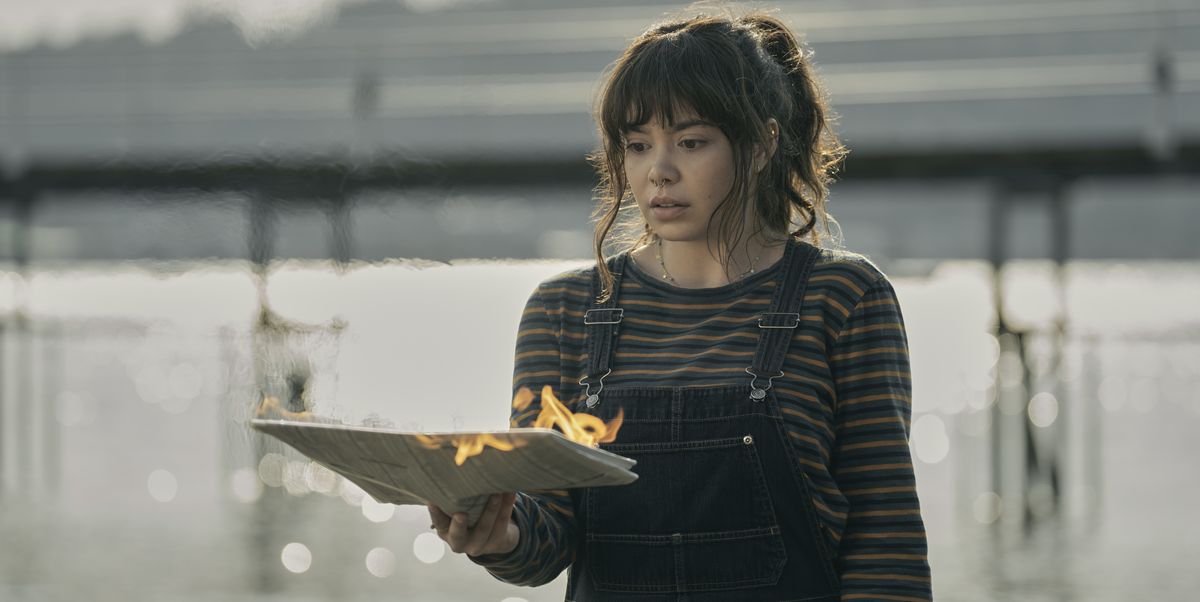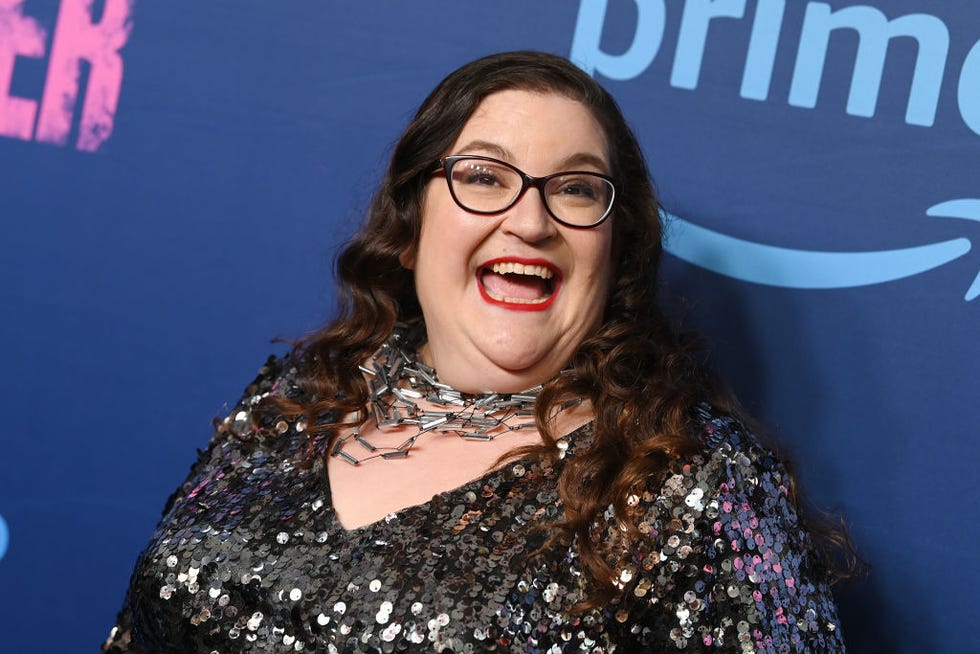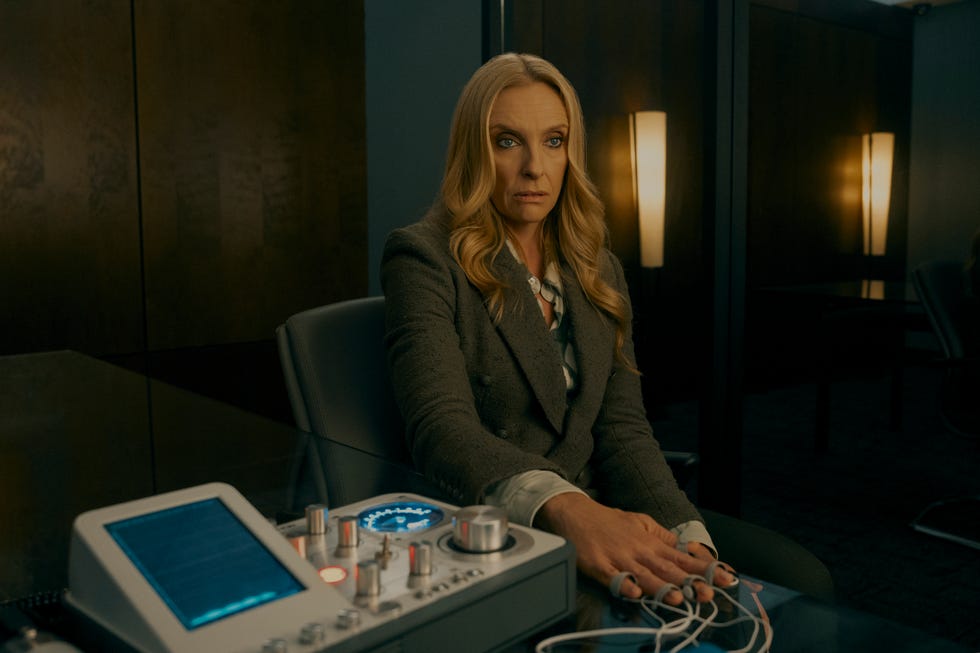In the Amazon Prime Video series The Power, adapted from Naomi Alderman’s novel of the same name, the status of women in society is forever shifted when electricity begins to bloom beneath their fingertips. For some, this inexplicable power is a torment. For others, it’s leverage—a means with which to reshape long-standing hierarchies and elevate their sex (and, depending on their motives, themselves).
The book, first published in 2016, was eventually named one of the “10 Best Books of 2017” by The New York Times for its speculative prowess. In particular, the manner in which Alderman reimagined women as the “dominant sex”—without stooping to the oversimplification and myopia of the girlboss era—spoke to an enflamed imagination felt across the country (and the globe) after Brexit in Alderman’s native U.K. and the election of President Donald Trump in the U.S.
As The Power makes its second wave in the form of a TV series, which dropped its season 1 finale last night, Alderman spoke with ELLE.com about the challenges of adapting a story as the world changes; her hopes for a second season; and why she needed seven years to finish her next book, The Future.
Tell me about the process of developing this series. What preconceptions did you have going in that you ultimately had to let go of?
It’s a very interesting process, and particularly, nobody expected the global pandemic, so that certainly threw a little spanner in there. I had had a very good experience working on the movie Disobedience, which is based on my novel, and so I went in with high hopes, which indeed have been met by the show. I had a bidding war for the rights before it was published, so I thought, Well, this has got a good chance of becoming something, surely. And I sold the rights to Sister Pictures, who really—they were just incredibly impressive, incredibly ambitious for the show. I then worked on writing the pilot script for probably 18 months to really get that perfect. That was my first TV script. We also had a bidding war in Hollywood between different networks.
And when I had the meeting with Jen Salke at Amazon Studios, by the end of the meeting, she was crying and I was crying, because we had both connected so deeply with the idea behind the show. We put together an incredible writing team, some of whom obviously had to end up dropping out because of the pandemic.
But we’ve had some fantastic writers on board. And we were all ready to go—we were at the beginning of shooting in February 2020, and then we had to put everything away. But, in some ways, I think it worked to the advantage of the material. One of my favorite stories is, even at the end of 2019, people in the writers’ room were saying, “If women developed the power to electrocute people at will, would they really close the schools? How would that even work?” And I feel like now we all understand how…
Yeah, seeing the political bureaucratic response to a crisis in real time had to have helped flesh out your material.
And that feeling that you need to be monitoring, in that type of crisis, what’s happening all around the world. In France, you are watching what’s happened in China, and in the U.S. you’re seeing what’s happening in France, and in Brazil you’re looking at Korea. So that idea of a real global event, I think, in some ways, was helpful for people to understand the show.
This series has landed at a different point in the wider feminist conversation than the book itself, which was published in 2016. A lot of our discourse has shifted. I don’t know if it’s necessarily evolved—
Depends on the individual feminist.
Exactly. But it has certainly shifted in the years since 2016. I’m curious about how that shift impacted the way you approached adapting this material for TV.
Right. So it is interesting. When we were pitching the show, there was a feeling of, Oh, well, maybe because of #MeToo, all this is—we’re done now. Everything’s sorted out. And I think nobody has that feeling anymore. The essential question has become, if anything, more relevant. I think we’re not under any illusions right now that everything is fine, and that we are on an inexorable road toward greater liberation.
I also think that there have been, to me, very upsetting, distressing movements within some elements of feminism where there’s a real hang up about… I’m a trans-inclusive feminist, right? And I find it upsetting that this issue has somehow become something that is separating women from other women, feminists from other feminists, and just at the time when we could do with some unity. Never underestimate the capacity of progressives to attack their own side. So that’s a complicated question. I’m very delighted that we have intersectional representation in the show, that we have trans representation in the show, and it’s a show about women’s liberation in some way. And all of those questions, these are things that we had to think about in order to bring the show up to date. But, unfortunately, the world has not made the question less relevant. It would be nice if it had.
Do you think this shifting conversation has changed the way The Power itself, as a story, is being received and discussed by audiences?
I’ve seen people saying, “Well, this show doesn’t go as far as the book,” and I go, “Well, you’ve only got the first season.”
I firmly believe that you need to have those moments of wish fulfillment before you get into those big hard questions about who has power and what does having power do to them? I definitely think that these days, it’s very important, particularly to a lot of young feminists—and I entirely understand why—that feminist work should be inclusive and intersectional. And I think I’m open to those questions, critiques, and I would say that my work has been improved by talking to audiences and fans. A lot of people have engaged with me in a really loving way and said, “Hey, have you thought about this?” And I’m delighted. I’m always delighted. In my other life, I make video games. I’m the co-creator and the writer of a game called Zombies Run, which we Kickstarted in 2011. When your audience have funded your work, you develop a real openness to discussing it with them.
And I think maybe more than some authors, I don’t know, I’m very happy to hear from my readers, and very relaxed about the idea that sometimes they’re going to tell me that I fucked something up. They’re going to do that, because I’m a human, and they’re going to tell me, and then I’m going to go, “Thank you.”
I’d love to know how, in your opinion, the sort of violence and burn-it-down anger that’s present in a lot of your work, and particularly in The Power, ultimately serves this story rather than detracting from it.
I think one of the things that I’m often up to in my work is trying, if I can, to radically reimagine the status quo, and that’s fun. That’s in the tradition of some of the speculative writing that I love the best. It’s also a philosophical approach. My first degree is in philosophy, and one of the things that you do in philosophy is to imagine, What if things were different? You do a little thought experiment, and then you go, Okay, well, how does it feel?
So in terms of what I’m doing with my work, I think one of the things that I’m most interested in fiction is to see things as if they were different. Just to imagine what it would be like and then go, Okay, well, let me compare that to what we have now. Does it seem like that way of doing things is completely implausible? Or does it seem better? Does it seem interestingly better in some ways and worse in other ways? I guess the burn-it-down energy—which I like, I should get it on a shirt.
I’m a novelist; I’m not a Molotov cocktail thrower, so I’m very interested in thinking about what would happen if we burned it down, rather than in actually doing arson. But I think those questions are incredibly important because we can so easily fall into believing that the way we do things is the only way they can be done. And that’s a trap. That is a limit. Really, possibly, the most profound limit on human freedom is to say the way that things happen here and now is the only way they could possibly happen.
What was behind the decision to end the first season of this series where it does, which is only about a third-ish into the novel?
This is really a question about pacing. Because if somebody had commissioned us to make a season that was, I don’t know, 30 episodes long, each episode an hour, then we would’ve done the whole book.
It’s a complicated book, and what I’ve realized now is that it takes an audience quite a while to get to grips with each set of characters… And also since the book is trying to encompass the whole world, we took the decision that we would need to give the audience some time with each set of characters to really understand them before we start, excuse me, fucking shit up.
So that’s how that decision was made. And obviously, we leave the characters at quite an explosive, exciting point in all of their stories.
What can you tell me about the future of the show?
Well, we’re waiting to hear. I think a lot of it will depend on viewers and where the viewers are, and many questions that are totally above my pay grade. What I can tell you is that I would like to do another couple of seasons of it and get the story done. And not leave it with a kind of, “Yeah, if women could electrocute things, you’ll basically all be great—there might be a little outbreak of violence in a country you’ve never heard of, but apart from that it’ll be fine!”
Your next book, appropriately named The Future, is your first in seven years, and you jokingly alluded on Instagram to the fact that it’s been a little while. I don’t mean to ask, “Oh, what took you so long?” But why did you need this time to perfect the story?
I will tell you all the reasons, and one of them is personal—but, also, I feel like it’s something people should talk about more. One reason is I was making a TV show. Another reason is, when I started working on the new novel, it was a novel about a pandemic. And at that point I thought, I can’t write the book like this anymore. Because nobody wants to read that now. So I rethought the book. And the third reason is a sad reason, which is that I had several pregnancy losses in a row.
That’s the honest truth. And I feel like, when people have that experience, there’s a feeling of like, Oh, I want to conceal it. I don’t want to talk about it. But I feel like this is something that happens to a lot of women. And it’s almost impossible to speak about because if you say, “Well, I got pregnant here with my baby,” then everyone goes, “Oh, of course, you had a baby.” But if you just were pregnant a bunch of times and then there’s no baby, then you go, Well, now I’m going to have to let you into some tragedy in my life. But this is the reality of women’s lives; I’m not the only person this has happened to.
So I don’t feel like I have anything to be ashamed about with that, and that’s the truth. And I hope the next one doesn’t take seven years.
This interview has been edited and condensed for clarity.
Culture Writer
Lauren Puckett-Pope is a staff culture writer at ELLE, where she primarily covers film, television and books. She was previously an associate editor at ELLE.



